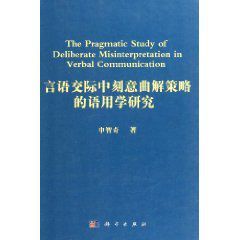內容簡介
本書從語用學角度對刻意曲解這一交際策略進行了定性分析。不同於誤解中的無意的信息傳遞,刻意曲解是語言使用者在會話交際中為了達到某種交際目的,有意利用某種特殊的語境和對方話語中的含糊的、不確定的表達方式,歪曲對方的話語意圖,以便達到某種交際效果的一種語用策略。本書從三個方面研究刻意曲解的動態特性,即,使用刻意曲解的前提條件、刻意曲解的實現方式、刻意曲解的功能。刻意曲解的前提條件包括:交際雙方的信息共知、對最佳關聯的尋求以及刻意曲解的觸發語。語言使用者實現刻意曲解方式有兩個:故意違反同一律和故意脫離或改變語境。而語言使用者使用刻意曲解策略的功能是實現語境順應和交際意圖。
圖書目錄
序
前言
Acknowledgements
Chapter 1 Introduction
1.1 Introduction
1.2 Notes on related terms
1.3 Terminological issue
1.4 An overview of related studies
1.4.1 Pragmatic studies of misunderstanding
1.4.2 Related studies of deliberate misinterpretation
1.5 The perspectives of present study
Chapter 2 A Description of the Conceptual Framework
2.1 Introduction
2.2 The delimitation of deliberate misinterpretation
2.2.1 Working definition of deliberate misinterpretation
2.2.2 Properties of the process of deliberate misinterpretation
2.2.3 Deliberate misinterpretation vs. accidental misunderstanding
2.2.4 Deliberate misinterpretation vs. digression
2.2.5 DMI/deliberate non-understanding vs. faked non-understan-ding
2.2.6 Deliberate misinterpretation vs. misleading
2.3 A discussion of the theoretical background of the framework
2.3.1 Linguistic adaptation theory
2.3.2 Relevance theory
2.3.3 Face theory and politeness
2.4 The characterization of conceptual framework
2.4.1 Cognitive Basis of deliberate misinterpretation
2.4.2 Deliberate misinterpretation as a process of choice making.
2.4.3 Communicative needs
2.4.4 Contextual correlates of adaptability
2.4.5 Interactional natures
2.5 Summary
Chapter 3 Prerequisites to Deliberate Misinterpretation
3.1 Introduction
3.2 Mutuality
3.2.1 Mutuality of logical information
3.2.2 Mutuality ofencyclopaedicinformation
3.2.3 Mutuality of linguistic information
3.2.4 Mutuality of immediate context
3.3 Relevance as a generalized communicative principle
3.4 Triggers of deliberate misinterpretation
3.4.1 Minimal information provided by $1
3.4.2 Indeterminacy of Sl's conversationalutterance
3.5 Summary
Chapter 4 Means of Deliberate Misinterpretation
4.1 Introduction
4.2 Deliberately violating the Law of Identity
4.2.1 Deliberately violating the Law of Identity in concept
4.2.2 Deliberately violating the Law of Identity in judgment
4.3 Deliberately ignoring the context
4.3.1 Disregarding the speech situation
4.3.2 Telling atruism
4.3.3 Being overliteral
4.4 Summary
Chapter 5 Functioning of Deliberate Misinterpretation...
5.1 Introduction
5.2 Contextual correlates affecting the choice of DMI
5.2.1 DMI as a means of adaptation to the social world
5.2.2 DMI as a means of adaptation to the mental world
5.3 Communicative functions of DMI
5.3.1 Improving interpersonal relationships
5.3.2 Manipulating information
5.3.3 Creating special communicative effects
5.4 Properties of the functioning of DMI
5.4.1discrepancy
5.4.2 Implicitness
5.5 Summary
Chapter 6 Conclusion
6.1 The generative mechanism of DMI
6.2 The variable means of DMI
6.3 Functioning of DMI
Bibliography

